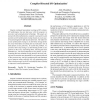Free Online Productivity Tools
i2Speak
i2Symbol
i2OCR
iTex2Img
iWeb2Print
iWeb2Shot
i2Type
iPdf2Split
iPdf2Merge
i2Bopomofo
i2Arabic
i2Style
i2Image
i2PDF
iLatex2Rtf
Sci2ools
116
click to vote
IPPS
2002
IEEE
2002
IEEE
Compiler-Directed I/O Optimization
Despite continued innovations in design of I/O systems, I/O performance has not kept pace with the progress in processor and communication technology. This paper addresses this I/O problem from a compiler’s perspective, and presents an I/O optimization strategy based on access pattern and storage form (file layout) detection. The objective of our optimization strategy is to determine storage forms for array-based data sets taking into account future use of data (future access patterns). To tackle this problem, we present a three-step strategy: (i) determining all I/O access patterns to the array, and among them, selecting the most dominant (i.e., the most beneficial) access pattern; (ii) determining the most suitable storage form for the array taking into account the most dominant access pattern detected in the previous step; and (iii) optimizing the non-dominant access patterns using collective I/O, an optimization that allows each processor to do I/O on behalf of others if doing...
Access Patterns | Distributed And Parallel Computing | I/O Optimization Strategy | IPPS 2002 | Storage Form |
Related Content
| Added | 15 Jul 2010 |
| Updated | 15 Jul 2010 |
| Type | Conference |
| Year | 2002 |
| Where | IPPS |
| Authors | Mahmut T. Kandemir, Alok N. Choudhary |
Comments (0)

